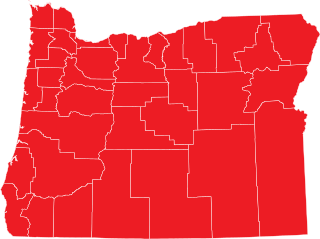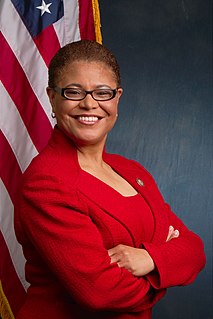
Proposition 53 was a California ballot proposition on the October 7, 2003, special recall election ballot. It failed to pass with 3,020,577 (36.2%) votes in favor and 5,318,065 (63.8%) against. It was placed on the ballot by a vote of the state legislature on Assembly Constitutional Amendment 11.

The California State Legislature is a bicameral legislature consisting of a lower house, the California State Assembly, with 80 members; and an upper house, the California State Senate, with 40 members. Both houses of the Legislature convene at the California State Capitol in Sacramento. The California State Legislature is one of just ten full-time state legislatures in the United States.

Proposition 60 was an amendment of the Constitution of California, enacted in 2004, guaranteeing the right of a party participating in a primary election to also participate in the general election that follows. It was proposed by the California Legislature and approved by the voters in referendum held as part of the November 2004 election, by a majority of 67%.

Proposition 60A was an amendment of the Constitution of California, enacted in 2004, relating to funds from the sale of government property. It was proposed by the California Legislature and approved by the voters in a referendum held as part of the November 2004 election, by a majority of 73%.

Proposition 62 was a California ballot proposition on the November 2, 2004 ballot. It failed to pass with 5,119,155 (46.1%) votes in favor and 5,968,770 (53.9%) against.

The Oregon Legislative Assembly is the state legislature for the U.S. state of Oregon. The Legislative Assembly is bicameral, consisting of an upper and lower house: the Senate, whose 30 members are elected to serve four-year terms; and the House of Representatives, with 60 members elected to two-year terms. There are no term limits for either house in the Legislative Assembly.

Oregon ballot measure 48 was one of two unsuccessful ballot measures sponsored by the Taxpayers Association of Oregon (TAO) on the November 7, 2006 general election ballot. Measure 48 was an initiated constitutional amendment ballot measure. Oregon statute currently limits state appropriations to 8% of projected personal income in Oregon. If Governor declares emergency, legislature may exceed current statutory appropriations limit by 60% vote of each house. This measure would have added a constitutional provision limiting any increase in state spending from one biennium to next biennium to the percentage increase in state population, plus inflation, over previous two years. Certain exceptions to limit, including spending of: federal, donated funds; proceeds from selling certain bonds, real property; money to fund emergency funds; money to fund tax, "kicker," other refunds were included in the provisions of the measure. It also would have provided that spending limit may be exceeded by amount approved by two-thirds of each house of legislature and approved by majority of voters voting in general election.

California's state elections were held November 7, 2000. Necessary primary elections were held on March 7. Up for election were all the seats of the State Assembly, 20 seats of the State Senate, and eight ballot measures.

California's state elections were held November 3, 1992. Necessary primary elections were held on March 3. Up for election were all the seats of the State Assembly, 20 seats of the State Senate, and fifteen ballot measures.

Proposition 1A was a defeated California ballot proposition that appeared on the May 19, 2009 special election ballot. It was a constitutional amendment that would have increased the annual contributions to the state's rainy day fund. The proposition was legislatively referred to voters by the State Legislature.

Proposition 1C was a defeated California ballot proposition that appeared on the May 19, 2009 special election ballot. The measure was a legislatively referred constitutional amendment that would have made significant changes to the operation of the State Lottery.

Proposition 1D was a defeated California ballot proposition that appeared on the May 19, 2009 special election ballot. The measure was legislatively referred by the State Legislature. If approved, the proposition would have authorized a one-time reallocation of tobacco tax revenue to help balance the state budget.

Proposition 1E was a defeated California ballot proposition that appeared on the May 19, 2009 special election ballot. The measure was legislatively referred by the State Legislature. If passed Proposition 1E would have authorized a one-time reallocation of income tax revenue to help balance the state budget.

Proposition 1F of 2009 was a measure approved by California voters relating to the salaries of state officers. It was an amendment of the Constitution of California prohibiting pay raises for members of the State Legislature, the Governor, and other state officials during deficit years. It was proposed by the legislature and approved in a referendum held as part of the May 19, 2009 special election ballot, in which the California electorate also voted on five other propositions.

Proposition 4 of 1911 was an amendment of the Constitution of California that granted women the right to vote in the state for the first time. Senate Constitutional Amendment No. 8 was sponsored by Republican State Senator Charles W. Bell from Pasadena, California. It was adopted by the California State Legislature and approved by voters in a referendum held as part of a special election on October 10, 1911.

The California state elections, November 2010 were held on November 2, 2010.

The California state elections was held on Election Day, November 6, 2012. On the ballot were eleven propositions, various parties' nominees for the United States presidency, the Class I Senator to the United States Senate, all of California's seats to the House of Representatives, all of the seats of the State Assembly, and all odd-numbered seats of the State Senate.

In California state elections, 2014 was the first year in which the top statewide offices were elected under the nonpartisan blanket primary, pursuant to Proposition 14, which passed with 53% voter approval in June 2010. Under this system, which first went into effect during the 2012 election year, all candidates will appear on the same ballot, regardless of party. In the primary, voters may vote for any candidate, regardless of their party affiliation. The top two finishers, regardless of party, then advance to face each other in the general election in November.

California state elections in 2018 were held on Tuesday, November 6, 2018, with the primary elections being held on June 5, 2018. Voters elected one member to the United States Senate, 53 members to the United States House of Representatives, all eight state constitutional offices, all four members to the Board of Equalization, 20 members to the California State Senate, and all 80 members to the California State Assembly, among other elected offices.







